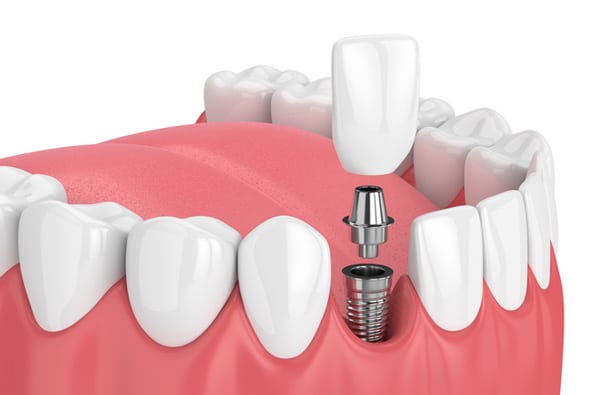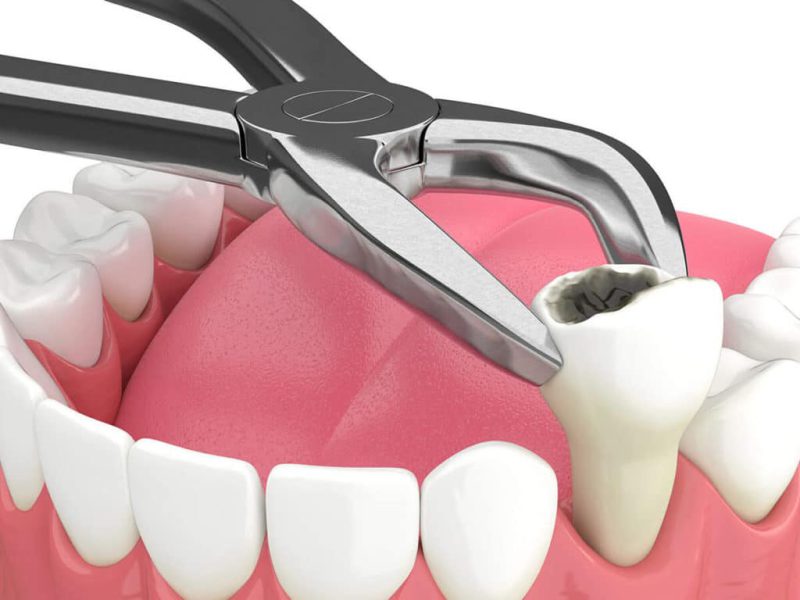
Dental implants is the process of replacing missing teeth (or a single tooth) that cannot be saved by conventional means and needs to be removed.
Dental Implants
Dental implants can range from single-tooth replacement to a complete upper and lower arch replacement. The dental implants procedure can take place in the dental chair under local anaesthetic or in hospital under general anaesthetic. Your dentist will consult with you beforehand to determine your preference of treatment, suitability, the time requirements and a complete costing for the procedure, before you are referred to a prosthodontist or oral & maxillofacial surgeon for all surgical components of the treatment.
Dental implants have been used since the mid-1960s to permanently replace missing teeth. They look and feel like your own teeth. All dental implants have three main components: a titanium screw fixture that goes into the bone, an abutment (a piece of metal attached to the screw which sits above the gumline), and a crown (which is fixed on top of the abutment) that is either all ceramic or porcelain fused to precious metal. In most cases it is very difficult to see the difference between a new implant and your own natural teeth.
There are different types of dental implants, which during consultation, you and your clinician can discuss which will be best for you.

Conventional Dental Implants
Conventional implants are an effective long-term solution for replacement of missing teeth. They consist of the three components, the implant, which is placed into the jawbone, an abutment (a metal piece that is screwed into the implant), and then a crown. Conventional implants have a high success rate.
Immediate Dental Implants
The procedure of immediate teeth involves placing the implant and replacement tooth at the same time, instead of waiting for three to six months between the first and second stage, as you would with conventional implants. Immediate implants are an instant process that allows you to have your new tooth in around an hour.


Bone Grafting For Dental Implants
When a tooth is removed, the area of jawbone directly beneath it begins to recede. This loss of bone can continue over time, often resulting in changes to the face such as sunken lips or cheeks. If a patient is found to have insufficient jawbone it previously meant that dental implants could not be fitted, but because of advances in medical technology, bone can now be rebuilt with a bone graft.
All-On-4® Dental Implants
Dentist by the Park is proud to offer their patients All-On-4® implants, the superior solution for dental implants in the permanent replacement of teeth.
All-On-4® implant treatment offers a solution for patients who need most or all of their remaining teeth in one or both arches replaced, leaving you with beautiful, functional and long-lasting teeth. Unlike traditional full-arch implant that require three to six months’ healing time, All-On-4® treatment can be completed in 1-2 days, offering patients a almost immediate restoration.
If you have difficulty chewing food, have ill-fitting dentures, have broken teeth or are anxious about your smile, All-On-4® implants may be the treatment for you.


Bone Grafting For Dental Implants
When a tooth is removed, the area of jawbone directly beneath it begins to recede. This loss of bone can continue over time, often resulting in changes to the face such as sunken lips or cheeks. If a patient is found to have insufficient jawbone it previously meant that dental implants could not be fitted, but because of advances in medical technology, bone can now be rebuilt with a bone graft.
Frequently Asked Questions
Mini implants are an alternative approach that allows the placement of very small screws in areas where other implantable devices cannot be placed. These screws do not require functional attachment of the implant to the surrounding bone; they rely on mechanical retention, which makes their removal relatively simple and non-invasive. Another advantage of mini implants is that they can be loaded immediately.
Dental bridges literally “bridge” the gap created by missing teeth. They are made up of one or more crowns for the teeth adjacent to the gap, along with a false tooth or teeth attached. These anchoring teeth are called abutment teeth and the false teeth are called pontics. The latter can be made from gold, alloys, porcelain, zirconia or a combination of these materials. The result is a dentition that is fully restored in terms of function and appearance.
There are four main types of dental bridges available as a means of tooth replacement.
Conventional bridges are used when there are natural teeth present on both sides of a gap created by the missing tooth. They involve reshaping the teeth on either side of the gap to make room for cementing crowns on them, with a pontic (false tooth) in between to replace the missing tooth.
Cantilever bridgesare used when there is an adjacent tooth on only one side of the missing tooth or teeth. The pontic is supported on only one side, rather than on both sides, by one or two crowned abutments, depending on how much support is required or the length of the bridge.
Maryland bridges(resin-bonded bridges) are considered a conservative alternative to traditional bridges. These bridges consist of a single pontic that is held in place by a metal or porcelain framework (wing). This framework is bonded onto the back of the tooth adjacent to the missing tooth with composite resin cement. Your specialist will need to remove only a very small amount of tooth from the back surfaces of these teeth to make room for the wing, with minimal alteration of the adjacent tooth required.
Implant-supported bridgesare the most stable means of tooth replacement. The specialist surgically embeds tiny biocompatible implants made of titanium in a patient’s jawbone, and these secure the entire restoration. For every missing tooth one dental implant is placed. An alternative is a pontic suspended between two implant-supported crowns. Though this procedure can be more expensive, invasive and time consuming than the other treatment options, the outcome of this treatment option can last a lifetime, making it worth the investment.
Dental implants are made of titanium, as it is a biocompatible material, which is accepted by the body. It serves as a strong foundation for replacement teeth, with a high success rate and long lifespan.
Zirconia provides an alternative to titanium implants. A type of dental ceramic they have not been around for as long as titanium implants, but so far have proven to be quite durable.
The crowns attached to the implants are usually made of all ceramic or high-grade porcelain fused to precious metals such as gold.
When it comes to dental implants your specialist will discuss with you if it is the best option, usually they will try to save the tooth first but in cases where this is not possible they might recommend extraction and an implant.
Some of the main factors in determining whether you are a suitable candidate for dental implants include, having adequate bone, in terms of both quality and volume, which is assessed during an examination (though this can be solved with a bone graft), good oral hygiene and you meet the general medical requirements.
Dental implants can provide you with a functional and aesthetically pleasing alternative to missing or severely damaged teeth. Losing a tooth can have a detrimental impact on your remaining teeth, often resulting in the remaining teeth shifting to fill in the space left behind. A missing tooth can lead to speech problems, difficulty chewing or even discomfort; all of these can be resolved with the placement of an implant.
An implant is fixed directly into the body and as such is independent of the rest of the teeth, which means that if something goes wrong only the implant itself will be affected, in which case your practitioner will assess the area and attempt to resolve the issue, without any of your other teeth being affected.
Patients with many missing teeth used to have no choice other than dentures, but with the technological advancements over the years –higher quality dental tools and materials, now patients have more options when it comes to replacing teeth, and dental implants offer a long lasting solution.
The procedure of treatment involves:
- A thorough examination of your medical and dental health, assessment of bone density and the sinuses.
- The area where the tooth is missing is prepared, followed by treatment of the surrounding gums to check that they are healthy.
- The titanium screw will be placed, and the area is generally allowed to heal for approximately two to three months.
- The implant will be surgically exposed and a healing cap placed.
- Impressions taken and then sent to our in-house laboratory, which act as the blueprint for your dental crown, which is created by hand.
- Approximately two weeks later, the healing cap will be removed and replaced with your new dental crown.
Over time, your dental implant will fuse with the surrounding bone, acting much like the root of a natural tooth.
Your specialist will discuss the procedure with you beforehand so you fully understand everything involved, the decision will be made as to whether it will take place in the dental chair or in hospital. If you feel anxious about the procedure discuss it with your practitioner and they will take that into account when making their recommendation, to ensure you are as comfortable as possible.
The costs involved with dental implants, include extraction, replacement denture or bridge while the implant is being prepared and then the cost of the implant. The overall cost of the treatment can vary depending on the type of implant chosen as well as the type of clinician – prosthodontist or oral & maxillofacial surgeon – who performs your implant procedure.
Dentist by the Park offers interest free dental payment plans to patients for all general, cosmetic and specialist treatment plans up to $9000 in value.
At Dentist by the Park your initial consultation as well as any aftercare and maintenance will take place with a general dentist, but a specialist will take care of all surgical components of your dental implant treatment. Your dental implant procedure will involve various specialists working together to ensure you get the best possible care and results. Periodontists, who are specialists in the field of gums and dental bone support and will treat the surrounding gums, oral & maxillofacial surgeons, who will perform the surgery (as well as extraction if necessary), and prosthodontists, who are specialists in working with fixed crowns and bridges.


